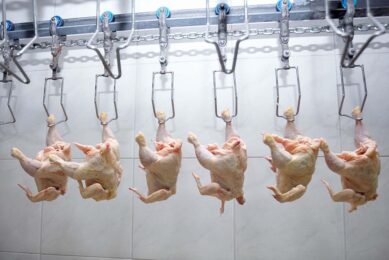Biden takes action to create a fairer poultry supply chain

US President Joe Biden and his deputy, Kamala Harris, have launched a US$1 billion action plan to reduce the power of a handful of large companies that have been controlling the American meat and poultry supply chains.
The move follows the signing of an executive order by President Biden in July to promote competition in the American economy and comes at a time when Americans are facing record inflation, which saw a 6.4% price jump in overall food prices in November with eggs and poultry rising even further.
In a meeting with farmers, ranchers and independent processors, President Biden said the plan would focus on 4 core strategies:
Expand independent processing capacity
- Increase competition and create more options for producers and consumers in the short term by kick-starting independent processing projects (US$150 million for 15 projects). Further funding to the tune of US$225 million will begin in the summer of 2022.
- Strengthen the financing systems for independent processors: The US Department of Agriculture (USDA) will work with lenders to make more capital available to independent processors, deploying up to US$275 million in partnership with lenders.
- Back private lenders that invest in independently-owned food processing and distribution infrastructure: The USDA has deployed US$100 million in American Rescue Plans to make more than US$1 billion in guaranteed loans available immediately.
Support workers and the independent processing sector
- Build a pipeline of well-trained workers and support safe workplaces with fairer wages: US$100 million will go to support the development of a well-trained workforce.
- Promote innovation and lower barriers to entry via publicly accessible expert knowledge: US$50 million is being provided in technical assistance and research and development to help independent business owners.
- Provide US$100 million in reduced overtime inspection costs to help small and very small processing plants that provide farmers with local alternatives to process poultry and livestock.
- Make US$32 million available in grants to 167 existing meat and poultry processing facilities to help them reach more customers by becoming federally inspected through Meat and Poultry Inspection Readiness Grants Programme.
Strengthen the rules that protect farmers, ranchers and consumers
- Issue new, stronger rules under the Packers and Stockyards Act, which is a law designed to combat abuses by meatpackers and processors.
- Issue new ‘Product of USA’ labelling rules so that consumers can better understand where their meat comes from.
Promote vigorous and fair enforcement of existing competition laws
- The launch within 30 days of a new portal for reporting concerns about potential violations of the competition laws.
- Increase transparency in cattle markets.
Tyson Foods voices objections
Earlier this year, Tyson Foods rejected similar White House statements, saying it was inaccurate to suggest that consolidation was leading to higher prices. It argued that scale allowed for greater efficiency and lower prices, adding that it had invested £15 billion in 11,000 independent farms to source chickens, cattle and pigs.
Sarah Little, North American Meat Institute spokeswoman, told Bloomberg that labour remained a huge challenge and was one reason for the rise in food prices. “Our members of all sizes cannot operate at capacity because they struggle to employ a long-term stable workforce. New capacity and expanded capacity created by the government will have the same problem,” she said.
A lack of competition “hurting consumers, producers and the US economy”
In a fact sheet released by the White House, the Biden administration says the meat and poultry processing sectors is a textbook example where a lack of competition is hurting consumers, producers and the US economy.
Farmers aren’t the problem, they are the solution
Earth is currently under a great deal of pressure, feeling the pain of billions of inhabitants going about their daily lives. Many blame protein consumption and its production, but it is actually farmers who are the stewards of our planet and can be its saviour. Read more…
“Four large meat-packing companies control 85% of the beef market. In poultry, the top 4 processing firms control 54% of the market. And in pork, the top 4 processing firms control about 70% of the market. The meatpackers and processors buy from farmers and sell to retailers, like grocery stores, making them a key bottleneck in the food supply chain.
“When dominant middlemen control so much of the supply chain, they can increase their own profits at the expense of both farmers, who make less, and consumers, who pay more. Most farmers now have little or no choice of buyer for their product and little leverage to negotiate, causing their share of every dollar spent on food to decline.”
Farmer profits dwindle, and consumers pay more
And even as farmers’ share of profits have dwindled, American consumers are paying more – with meat and poultry pries now the single largest contributor to the rising cost of food people consume at home.
The Biden administration is also concerned that when too few companies control such a large portion of the market, the US food supply chains are more susceptible to shocks caused by, for example, Covid-19, cyber-attacks, or fires. Over-reliance on a handful of giant processors leaves everyone more vulnerable, it said.













